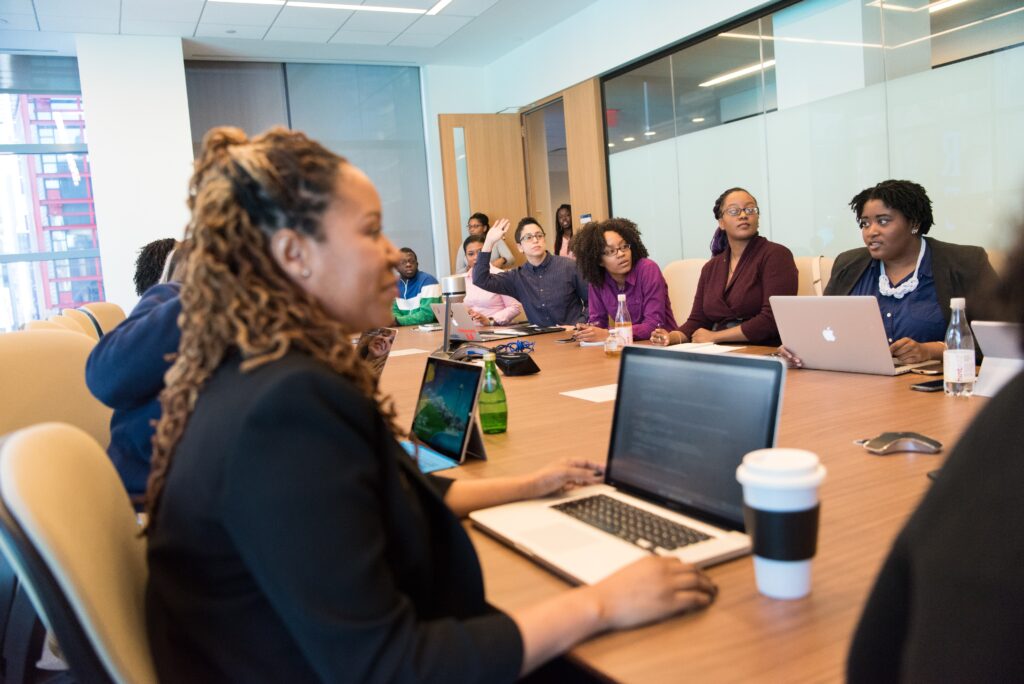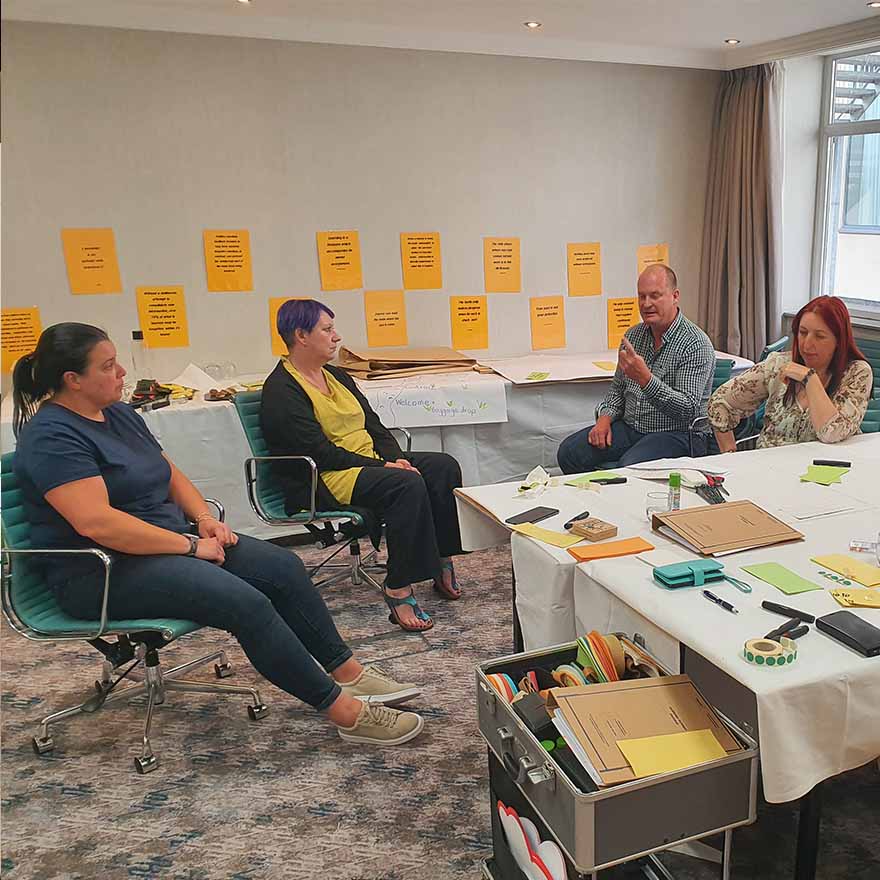Explaining the science of LEGO® Serious Play® and its benefits
Ah LEGO, that familiar old toy with the colourful bricks. It probably provided you with …

Ah LEGO, that familiar old toy with the colourful bricks. It probably provided you with …
You probably already have a general idea of the importance of team alignment in a …
Have you ever wondered how to create a team vision statement to map out your …
In our last article we examined the difference between a vision statement and mission statement. …
For the last few months, our blog posts have focused on how you can improve …
Are you new to a leadership role? Well worry not, we have seven tips to …
In the world of business, leadership is one of the most important components to creating …
The chance is that if you are interested in this series, you are probably already …
In a recent article published by the BBC, author Bryan Lufkin talks about the ripple …
The best cultures are the ones where the company values fit the organisation’s vision and …
The best cultures are the ones where the company values fit the organisation’s vision and team mission. A workplace culture should align with achieving the vision and goals of the company. For the best results, your business values should be memorialised on paper. But this process shouldn’t be done just to tick boxes; there must be true alignment within the organisation. Once the company values have been defined, every action, strategy, decision, and communication should support these organisational beliefs. This includes all HR mechanisms, from recruitment and hiring processes, to performance and review systems.
Experts link a positive work culture with increased productivity, higher profit margins, and improved staff satisfaction (Heinz, 2019). At the centre of an organisation’s culture are its values.
Company values are the beliefs, philosophies, and principles that drive your business. They are the deep-seated and pervasive standards that influence almost every aspect of the organisation, from responses to others, commitments and morals. Values are akin to the organisation’s DNA and create a belief system that guides their decision-making process.
Organisational culture comes about in one of two ways. First, it can be decisively defined, nurtured, and protected from the organisation’s inception, perhaps during a strategy workshop tailored for this purpose. Alternatively, it can occur haphazardly as a collective sum of the team’s beliefs, experiences, and behaviours. Either way, it’s likely, you will already have an organisational culture, whether you realise it or not.

Values are the bedrock of an organisation’s culture as they provide employees with a sense of common direction and guidelines for day-to-day behaviour (Scott et al., 1993). Therefore, it is important to have values to support your organisation’s vision. Without these values, it is harder to define the purpose of an organisation and create a sense of identity for your workplace.
Below we have included some explanations of why defining your company values can benefit your organisation:
Defining your business’ values can be a competitive advantage as it helps to differentiate your organisation from the conversation and can even increase profits.
Establishing your values can help a client to understand the purpose of your company. It gives an identity to your brand and enables your employees to educate clients on what the business stands for.
Often, organisations attract more business when their communications include messages that resonate with their values. In fact, more than 50% of CEOs and CFOs say corporate culture influences productivity, creativity, profitability, firm value, and growth rates (Forbes). So, if you want to build a relationship with clients, then using shared values is a way to earn loyalty or strengthen your relationship with clients.
Defining values can improve communication within an organisation and provide a moral direction. 76% of employees believe that well-defined business goals help to create a positive work culture (Bultin). As comms and business strategies become centred around these values, their messages usually become increasingly consistent and concise. When employees are repeatedly exposed to these messages, they begin to understand what is expected of them. As a result, it generally becomes easier for them to make the right decisions or adopt the preferred behaviour of the organisation.

“Employee turnover is costly. Hiring based on shared values, and cultural beliefs leads to winning results” (Forbes, 2017).
Values directly impact motivation and employee engagement. When organisations are clear and concise about their values, mission and team vision, they are better equipped to help their employees work towards these goals. Similarly, engaged employees are the ones that share your company values and believe in them, making it super important to define and communicate them sufficiently.
Business values also play a critical role in talent attraction, with 46% of job seekers citing an organisation’s culture as the decisive factor when choosing whether to apply for a position or not (Heinz, 2019). As well as attracting talent, values can help you with staff retention. For example, in organisations with positive company culture, job turnover operates at 13.9%, compared to low company cultures which operate at 48.4%. Employees who don’t like a company’s culture often quit their jobs (Smarp, 2020). Therefore, it is essential to define the values of an organisation to find a candidate that embodies these and will likely enjoy this working environment.
As previously stated, values come about in one of two ways. First, a company can define them from inception, like during strategy planning workshops. Secondly, and more commonly, they can take them from a collection of team beliefs, experiences, and behaviours. Either way, it’s likely, you will already have these values, whether you realise it or not. So, to help you unpack or clarify what you may already have within your organisation, below, PANDEK have included some questions that can be worked through in your own time. These questions are specially formulated to help you and your team evaluate and create alignment within your organisation.
Now you have been through these questions; it is time to think about how these answers could feed into the overarching values of your organisation. Focusing on fewer values is more effective, so you shouldn’t exceed seven (Kirkpatrick S. A, 2016). Below, PANDEK have incorporated some top tips to instil the company values you have created.

At PANDEK Group Ltd, we established our values very early on in our organisation and placed the people at the centre of everything that we do at PANDEK. Thus, we created the acronym ‘P.E.O.P.L.E‘, that we felt reflected every aspect of our work and came up with the following:
At PANDEK Group, we are a purpose-led company that cares about the well-being of our clients, staff, communities and stakeholders. We celebrate diversity as it is central to a successful workplace, and we promote an inclusive culture in all our activities. To ensure that our work gives back to the community, we offer support to individuals and organisations as they build upon their skills and experience in workshops or consultations.
We want to empower individuals with our work, using our workshops and meeting facilitation sessions to provide them with the tools to unlock new skills and thinking patterns or utilise the ones they may already have. Development is important to us, and we want to ensure that individuals can learn through our workshops and facilitated discussions. Our work is about providing a voice to everyone in the room, whether they choose to speak or not.
Fundamentally, people are at the core of our business and therefore healthy relationships are vital. We strive to be open and transparent in all our dealings. We take ownership, standing by our commitments, treating everyone equitably, and communicating openly and honestly. In return, there is a mutual bond of trust in our staff and services, maintained through the course of our relationship.
Passion is essential to everything that we achieve at PANDEK Group. It means caring for and taking pride in our work, believing in our staff and clientele, and having dedication in what and how we carry out our work. We pride ourselves in the level of energy and enthusiasm that we bring to our conversations and sessions.
At PANDEK, we harness the power of listening culture, taking feedback from those around us to improve our services. We prioritise effective communication and use it to inform our day-to-day practices, develop the quality and sustainability of our work. In turn, this enhances our ability to respond to the client’s needs. Ultimately, our facilitation, coaching and training services help our clients gain clarity in both their work and personal lives.
Engagement is central to our relationship with staff, clients and community. We want to be judged on our ability to produce results to the highest standard. It is important for us to approach challenges in a fun and creative way, making our work that much more enjoyable. Therefore, every investment or decision made has our staff and clients in mind. We invest in community and company events that we feel will help our employees and their families feel a connection to PANDEK beyond business as usual.

Hopefully, after reading this article, you now understand what workplace values are, how to define them, and why they are so important. Now you should be able to start defining your own organisation’s business values and visualise how they look in reality. However, if you are currently looking at how to restructure your company culture or create one and want further help with the process, please don’t hesitate to contact us at [email protected] or check out our website https://pandek.org/ and book a free consultation with us. Alternatively, you can call us on 07502265930. We are a group of experts with over 20 years of experience, trained to help you unleash the power of the values, vision and mission statements.
FOR INQUIRIES, PLEASE EMAIL US AT [email protected] OR
BOOK A FREE 30-MINUTE CONSULTATION AT HTTPS://PANDEK.ORG/.
If you would like to hear more about events, offers, blogs and newsletters CLICK HERE.
We understand that each company’s situation is unique. Tell us more about your needs and challenges and we will get back to you soon with some ideas, or book a free conversation and begin your journey.
COPYRIGHT © 2024 PANDEK GROUP LIMITED - ALL RIGHTS RESERVED - COMPANIES HOUSE - 12467210 - Operating across the UK - Based in the South West